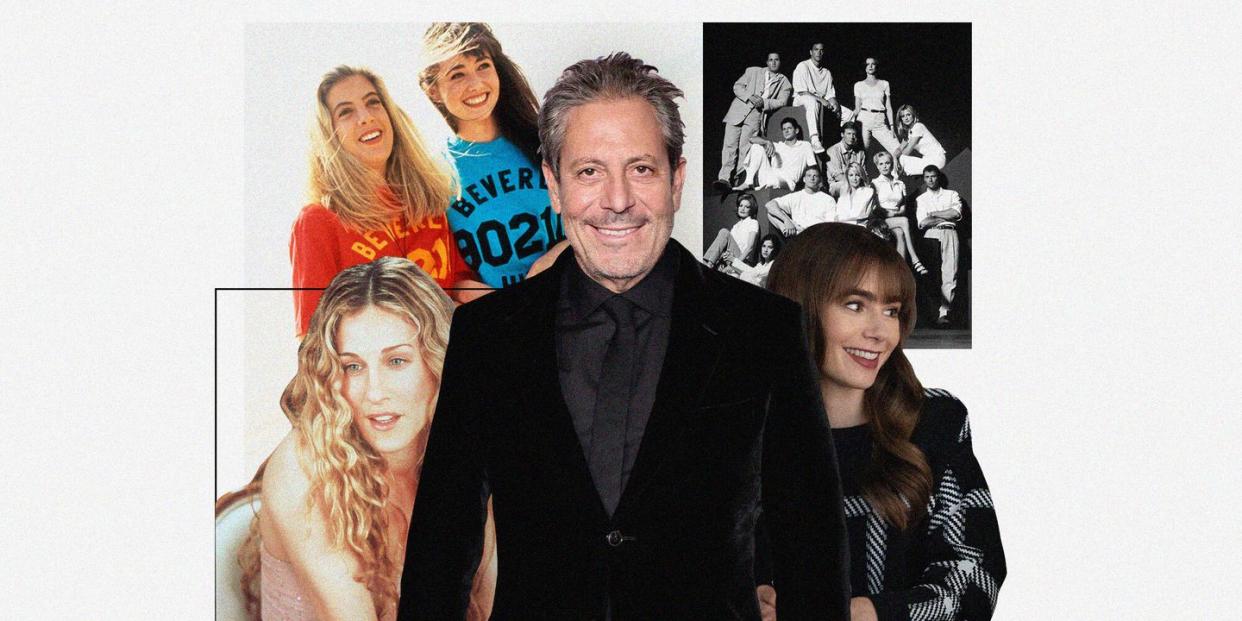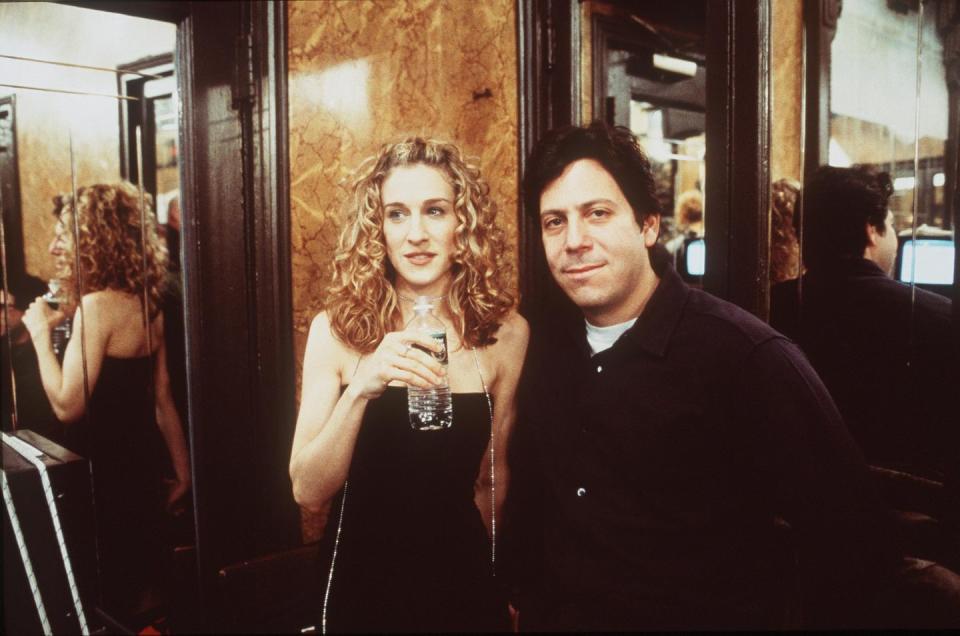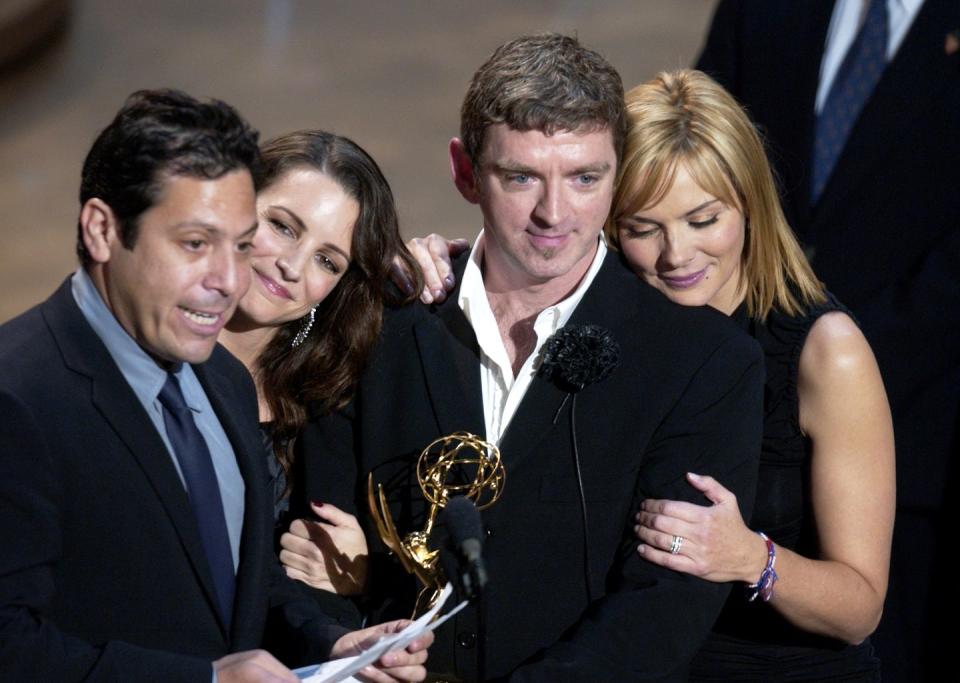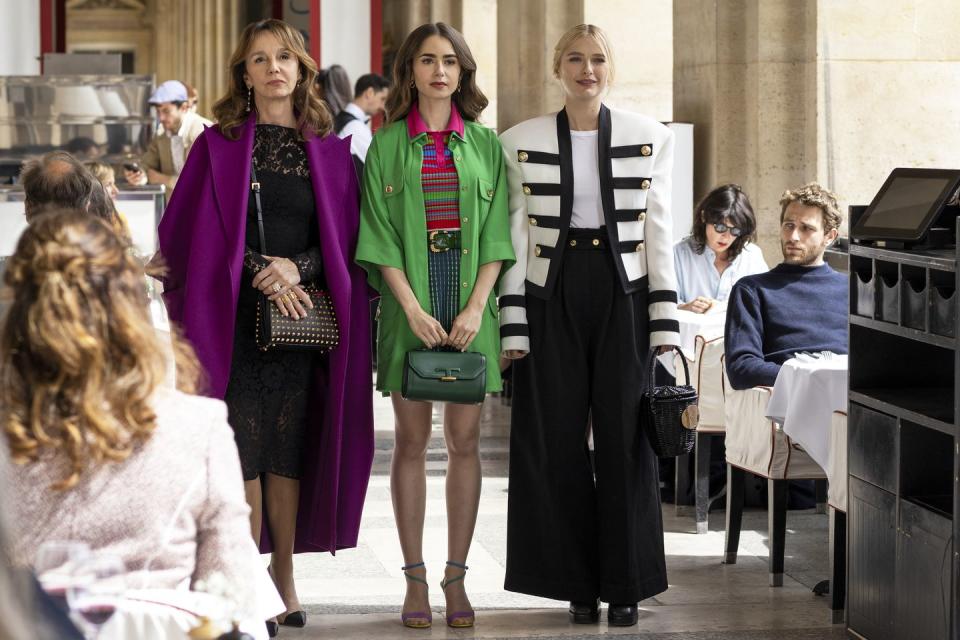The Creator of 'Emily in Paris' on Whether His Shows Are Realistic

- Oops!Something went wrong.Please try again later.
- Oops!Something went wrong.Please try again later.
- Oops!Something went wrong.Please try again later.
- Oops!Something went wrong.Please try again later.
- Oops!Something went wrong.Please try again later.
Ever since he was tapped to create Beverly Hills, 90210 at the age of 27, Darren Star has had an innate sense of what audiences want. And under the tutelage of executive producer Aaron Spelling—whose legendary career of 200-plus television credits included hits like The Mod Squad, Charlie's Angels, and Dynasty—Star honed those instincts. He envisioned 90210 as a drama about teenage life that didn't shy away from real issues like sex and sexuality, even when network censors and advertisers balked. It quickly became a generation-defining hit. When his follow-up, Melrose Place, didn't initially pop off when applying that same earnest tone to a group of single West Hollywood 20-somethings, he pivoted. "Melrose Place was tanking the ratings," Star says, "and I felt there was nothing to lose. It was almost an act of desperation: 'How can I turn this ship around and make this show something just totally outrageous and soapy and watchable?'" It became appointment television.
When broadcast network restrictions cramped his style, he pivoted again. This time to the fledgling cable network HBO, where he adapted his friend Candace Bushnell's New York Observer column, "Sex and the City," into one of the channel's earliest hits. Even his publishing world dramedy, Younger, found a loyal audience deep into the cable dial on TV Land, a network then known for airing musty reruns of Gunsmoke and Hogan's Heroes. (The show even retained those viewers when it later confusingly moved to Paramount+.)
Along the way, Star developed a particular reputation for having rare insight into women's desires—even though he's often countered that he doesn't create shows with the intention of targeting any one demographic. Still, his shows often feature iconic female characters clad in impossibly chic wardrobes by Star's longtime collaborator, costume designer Patricia Field, who spend their days climbing the corporate ladder and their nights climbing onto chiseled paramours. Some call these shows a fantasy; Star sees them as authentic emotional stories served to entertain—because isn't that the whole point of the entertainment industry?
No Darren Star show embodies his contemporary approach to entertainment more than Emily in Paris, which dropped its third season on Netflix over the holidays. The show is partly Star's love letter to the glamour of Paris (a city he's been enamored with since his teens), with a protagonist who embodies both the winningest and messiest instincts of her foremother, Carrie Bradshaw. In the end, Star says, "The viewers' connection to the characters is what makes a TV series click and last over a long period of time."
So, here, we're talking to Star about his career to find out why we can't get enough of Emily … and why we can't get enough of Darren Star.

You created 90210 in your 20s, when the experience of high school was still fresh in your mind. You created Melrose Place in your 30s, based on the experience of living in an apartment complex with a group of 20-somethings. You created Sex and the City in your 40s, again in a similar life stage to your characters. But Emily in Paris seems the most remote from your current experience. What challenges does that pose?
I fell in love with Paris when I was 19 while backpacking through Europe. Then I would try to go back as often as I could. I feel like there's something about Paris—you can be there at any age and it's still exciting. But the idea [for the show] came from what it was like for me to experience Paris in my 20s, when it was all very fresh, and how turned on I was about being there. That feeling is what I was trying to capture with the show.
You recently lived there for the first time, right?
I live there when we shoot the show. But a number of years ago, I took an apartment there when I was thinking about creating a series based in Paris, and I imagined what it would be like to live there, taking French classes, having a little bit of the Emily experience. Prior to that, it was just a place I would visit frequently, whenever I could. Especially in my 20s, whenever I could just get on a plane and go to Paris for a couple weeks, I would. It was the place I was just always drawn to.
You grew up in Potomac, Maryland. I imagine being a kid from the suburbs visiting Paris and being Darren Star visiting Paris today are two very different experiences. Do you think that Emily reflects the more wide-eyed experience that you might have had then?
Oh, of course, absolutely. Plus, I think that when you go to Paris at any age, you're always a little bit infantilized if you don't speak French. Which I've never been able to. Like Emily, as many years as I've taken French, it just never sticks. Maybe some people have a greater facility for languages than I do, but I think there's something about that—you lose a lot of your pretensions when you're in a country where you can't communicate and speak. You're reduced to the level of your most basic vocabulary.
Brenda goes to Paris one summer in 90210. Carrie goes with Aleksandr Petrovsky in Sex and the City. But it's always a place they go before returning to their real homes. Whereas now, especially in this season, Emily is grappling with the idea of Paris being home.
This is the only time I've written a show where the character isn't going there as an escape from something. It's not a pit stop. Although, even Emily didn't initially intend to go there and make it her home. But to me, having known people who have moved to Paris, it sort of happens that they go there with the intention of spending just a little bit of time. And then, they make friends, they build a life, they fall in love, and they're suddenly living in Paris.
Emily is a character who is very much all about planning her life in a very rigid way. I just love the fact that her experience in Paris upends her ideas about what life is about. She becomes more open to experience. She finds a richness of life that she just didn't have in Chicago.
You once said that you liked Carrie the most in Sex and the City when she was being messy, when she was having an affair with Big, when she operated in gray areas. There are moments when I find Emily selfish, annoying, and oblivious. Then in the next moment, despite myself, I find her charming. How do you approach the balance between likability and drama?
I think you have to start with the inherent likability of your character and your star; you have to have a real strong foundation of likability. You want to forgive these characters their flaws the way you would want to forgive yourself your flaws.
[Emily's] heart's in the right place. She means well. She wants to be doing the right thing, and it tortures her when she's not. Sometimes she has no sense of when she's making a mistake, but like all of us, when she realizes she's made a mistake, she then tries to figure out how to recover from it. And I think that's what makes a character like her more relatable and more interesting to write. In a sense, it even makes her easier to write—because we all live like that all the time.

The shows you create often draw a strong female audience, and you're thought of as someone who really understands what women want to watch. Do you consider that one of your strengths?
I really don't, I have to say. I guess my taste in entertainment is aligned with a lot of women, because I'm not necessarily writing to capture the female audience. I think there's a big male audience for Emily in Paris. I think that initially, men are reluctantly pulled into watching a lot of these series. And then, they end up becoming fans. I hear this often, almost apologetically, from men: "I saw your show. I really didn't think it would be for me, but I really love it." My shows are never intended to be watched solely by women, but I think maybe women gravitate towards them initially for what the themes are—they're not action shows; they're shows about relationships and emotions.
Did you see that episode of Seinfeld where Jerry loves watching Melrose Place but won't admit it?
Yes, yes. In fact, Larry David called me to tell me they were doing that. I remember being so flattered, because I was such a huge fan of Seinfeld. It was certainly one of my favorite shows at the time. I thought, Wow, we've really penetrated if Melrose Place has reached the fictional Seinfeld world. So I got a huge kick out of that.
Your shows are often described as "fizzy" or "frothy," which are the kinds of words critics use to describe—and perhaps diminish—shows with a female or gay male audience. Do you embrace a description like that or take exception to it?
I don't take exception to it. I think it's great if people are watching for whatever reason they're watching. I definitely feel like [my shows] are entertainment. Although I would ask, why would anybody watch anything if not to be entertained?
I guess the only reason I might take exception to it is because I want to give the audience credit for spending their time wisely. Let's put it that way. I don't think a viewer is engaging with a show for years if they're not finding it meaningful to them in some way. 90210 still means something to them. Sex and the City means something to them. Younger means something to them. Even Melrose Place, which I would say is the most purely soapy, over-the-top, fun entertainment [of my shows], means something to the people who watched it back then. And it meant something, because it was entertaining people at a time where you'd get together, sit down, and watch it together. It created a meaningful experience for them at that time of their life.
You mention the specific era of television that Melrose Place aired in. Audiences engaged with it on the coach with their friends or around the coffee machine at work the next day. It was pre-Internet discourse. In fact, the scene where Kimberly rips off her wig may be the last pre-Internet—and pre-spoiler—shocker on TV.
It was a shocker, yeah.
How has the Internet's immediate and constant stream of feedback affected the way you create and continue a show like Emily in Paris versus a show like 90210 or Melrose Place?
It was nice to not have had the constant feedback loop from the audience. You just put the show out there and you'd hear feedback from the people you know over a period of time. You were not getting that instant response, which can be fun and can almost feel like a drug, but can be dangerous if you let it affect your storytelling, your writing, your character development. Because the truth is that the audience often doesn't know what they want. You have to write the characters and the story you want to tell and just hope the audience connects to it. You've got to wall yourself off from them a bit.
When you created 90210, a storyline about a character losing her virginity and not suffering some kind of moralistic repercussions was a milestone. Similarly, having the openly gay character of Matt on Melrose Place was ahead of the curve. But he was also very controversial with advertisers and execs. You once said that the way they spoke about the character behind closed doors could be pretty gross. Were you an out gay man in the workplace, and did your personal experience affect your approach to those conflicts?
I was probably out in my personal life, but not out at work, not in the same sense. It just wasn't something that was discussed. And whether people knew about my sexuality or not, it wasn't like I was speaking about myself [when discussing Matt's character with higher-ups]. I was fighting for the character. You can't do a show about people in Los Angeles living in West Hollywood and not have a gay man. In fact, the reality is that the building would've been at least 50 percent gay.
But it was just a different world, so every little piece of progress I could make with the character felt like a win—like seeing him dating and in relationships, though I do feel like two men kissing at that time on television just wasn't happening. There was one episode where Billy sees Matt kissing a man in the courtyard. When we filmed the scene, [the executives] said, "You can't do it." And I said, "Well, you know what? We're filming it, and you guys can decide whether or not to air it. But I'm not going to censor myself." And in fact, they didn't air it.

Was it hard to not internalize their rejection of the character's sexuality as a rejection of your own sexuality and authentic experience?
I mean, yes, I could take it personally, but I realized I was writing a show for network television, and that meant I just couldn't make anything as authentically as I wanted. It's part of why I wanted to go off and do Sex and the City for HBO as quickly as possible. Because it wasn't just about the censorship of sex or sexuality, but the censorship of everything. You couldn't say shit, you couldn't say fuck, you couldn't write characters in the way people actually spoke. People used four-letter words in their conversations, and you couldn't say them on network TV. Maybe you could say three damns and two hells, and that would be a victory. I found it all ridiculous, but there were no other options in television at that time. So HBO really opened the door for me in terms of being able to create something frank and real.
You learned early the power of fashion onscreen. When watching the pilot of 90210, Aaron Spelling had a lot of comments on the characters' clothes and the importance of getting their fashion right. How did you come to embrace the impact of costuming when creating the world of a TV series?
I definitely saw the impact with 90210. From the beginning, we saw how engaged the audience was and how curious they were about what these characters were wearing. And so, I realized that as a showrunner, you're responsible for delivering that full experience. You're responsible for the production design. You're responsible for the editing. The choices in music, the cinematography, and the wardrobe. And when you let a piece slide, the audience will notice.
And as an audience member, whether you're aware of it or not, you're enjoying those shows on a lot of levels. And part of that is what the characters are wearing. Ultimately, the shows I do are just people standing in rooms talking. So there's got to be something to really look at. And that goes back to a very Old Hollywood style of moviemaking. If you look at movies for the '30s, '40s, '50s, wardrobe is hugely important. It was amazing to work with somebody in Aaron Spelling who had a connection to that part of Old Hollywood. He understood how it worked. Look at the shows he created; look at Dynasty, look at Charlie's Angles. He understood how the audience was responding to characters and how important it was to give them something to really look at on the screen.

You and costumer designer Patricia Field have been longtime collaborators. Have there been times where you didn't see eye to eye?
There were so many times, certainly during Sex and the City, where I'd say, "Don't let the clothes talk louder than the dialogue." And sometimes, I thought they did, and I would tell Pat, and we'd talk about it. But overall, I learned that the smartest decision I made about the wardrobe was hiring Pat Field and letting her do her thing.
Though Carrie's wardrobe eventually became so central to Sex and the City that the show had to acknowledge and explain how she could own that many shoes on a writer's salary.
Right, yeah. But you know, when I started Sex and the City, Candace Bushnell and I were very close. I knew her intimately, and I knew that Candace was a fashion player—but I didn't know where she got her clothes! She was a writer, a journalist, she wrote a column, and somehow she had the most unbelievable wardrobe. And she continues to dress like that today. She somehow figured it out. So there was a reference point for Carrie in Candace. It was not totally invented.
The costumes on Emily in Paris in particular have gotten a lot of attention for how extravagant—some would say unrealistic—they are. Has your approach to costuming changed this time around?
This season, Marylin Fitoussi, who Pat brought on initially, did the wardrobe. She's a brilliant French costume designer. And you know what? I think Emily in Paris, more than anything I've done, really lets go of the reality of how and why these people are wearing whatever they're wearing. We said, "Fuck it, let's just have a good time and enjoy it!" There's something about Paris that gives you permission to do that.
The interview has been edited and condensed for clarity.
You Might Also Like

